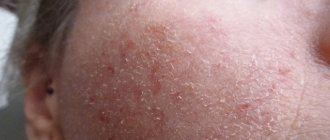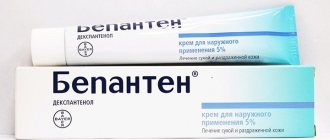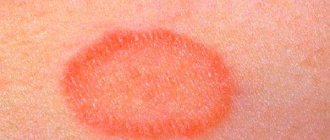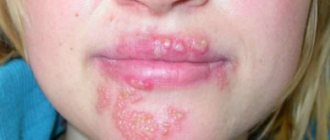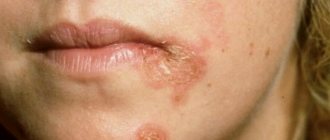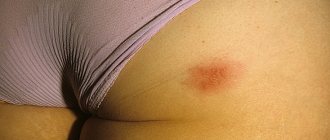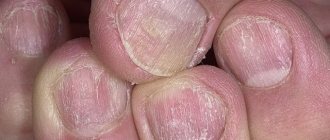Herpes in the mouth of a child or adult is characterized by the formation of grouped vesicular accumulations on the mucous membranes: they cause a lot of inconvenience and discomfort to the carrier. Oral herpes can be caused by HSV types 1 and 2 if the immune system is low.
Important! Oral herpes is recorded by medical practice much less often than other common forms - for example, herpes of the lips. The symptomatic picture may resemble stomatitis. To avoid mistakes and take the necessary measures to treat mouth ulcers, it is recommended to consult a doctor.
Causes of the disease
It was noted that the causative agent of such a disease as oral herpes is HSV types 1 and 2. The following factors can awaken the virus and provoke its activation:
- Lack of vitamins;
- Prolonged stress, depression, disorders;
- Physical fatigue;
- Oncology;
- Pregnancy;
- Having immune diseases such as AIDS or HIV;
- Taking a course of antibiotics.
Oral herpes can be the result of a thoughtless kiss, unprotected sex (especially oral), using common personal hygiene products, etc. The herpes virus poses a particular danger to others when the carrier is in the active stage.
Important! Herpes can be transmitted from mother to fetus, therefore special attention should be paid to medical examinations both during pregnancy and when planning it. You can take the necessary measures and find out the degree of risk of infection by the virus by getting tested for herpes.
How to distinguish herpes from stomatitis?
Oral herpes is often confused with a disease such as stomatitis. With both diseases, ulcers appear that heal only after two weeks. But it is important to distinguish herpes in a timely manner, because it has a completely different treatment:
- Stomatitis appears on the cheeks, throat, inner surface of the lips, and herpes affects areas that are adjacent to the bones and gums.
- With stomatitis, ulcers immediately appear, and with herpes, small blisters first form - they burst and turn into ulcers.
- Stomatitis can appear in different places, but herpes usually affects one place.
Oral infection: symptomatic picture
Oral herpes is easy to detect and recognize by its characteristic symptoms:
- Itching and burning of the affected areas;
- Inflammation and swelling;
- By the formation of bubbles with cloudy or clear liquid.
The listed symptoms may be supplemented by an increase in body temperature and a deterioration in the condition of the carrier.
Herpes on the oral mucosa can appear on the palate, throat, gums, and tongue.
Important! Depending on the location, herpetic rashes can cause a number of inconveniences to the carrier. Herpes on the gum, for example, can make eating food much more difficult, because the pain when chewing it is reminiscent of toothache. It happens that oral herpes affects the inner sides of the cheeks and lips, then conversations and active communication will become painful and unpleasant.
Herpes in the mouth of an adult occurs extremely rarely and most often due to negligence: promiscuity, close contacts with infected people. Usually the immune system immediately responds to the infection, and subsequent treatment is successful and simple. If herpes is found in a child’s mouth, it is recommended to immediately take treatment measures: there is a risk of complications and the development of herpes throat or herpetic sore throat.
The images below clearly demonstrate what herpes looks like in the mouth.
Methods and rules of treatment
How to treat herpes in the mouth? Regardless of what became the factor that caused the exacerbation of oral herpes, treatment must begin with taking antiviral drugs. They inhibit the activity of the pathogen and help accelerate the regeneration of the mucous membranes of the mouth. Adults are prescribed 400 mg of the drug for oral administration at a time, 3-4 times a day. Use antiviral ointments for external use:
- Amiksin;
- Zovirax;
- Ergofron;
- Acyclovir;
- Atsik.
As a local therapy, rinse and treat the affected areas with antiseptic agents:
- Hydrogen peroxide;
- Chlorhexidine;
- Chlorophyllipt;
- Miramistin.
You can relieve pain using the following medications:
- Metrogyl Denta gel;
- Tylenol;
- Kalgel;
- Nimesil;
- Ibuprofen.
View a selection of effective methods of dental restoration using composite material.
How to remove pip from the tongue? Effective treatment methods are described on this page.
Follow the link to learn how to strengthen loose teeth.
If a bacterial infection occurs and purulent ulcers form, antibiotics are prescribed:
- Cefatoxime;
- Amoxicillin;
- Biseptol.
It is imperative to carry out therapy aimed at increasing immunity and take:
- Dekaris;
- Imudon;
- Echinacea;
- Multivitamins.
Treatment of children and pregnant women
To treat children, an oil solution of chlorophyllipt and hydrogen peroxide are used as local remedies. They should be used to lubricate the affected areas of the mouth one by one.
The dosage of antiviral drugs is calculated in the amount of 15 mg/kg of body weight. Children take the product in capsules or as a suspension for 5-10 days.
Preparations with valacyclovir and famfiklovir are approved for use only from high school age. For HIV infection, valacyclovir is prohibited.
To alleviate the condition, before eating, the child’s oral mucosa is treated with a 0.5% solution of dyclonine hydrochloride. After the pain subsides, in order to speed up the healing of the ulcers, they should be treated with Cholisal gel.
During treatment, a doctor must be involved in the treatment. Medicines against viruses have contraindications for use during this period. Therefore, when prescribing them, it is necessary to take into account the risks and consequences of their use.
During the treatment of oral herpes, you need to include a large amount of dairy products in the menu. You should not eat very cold or very hot food. Increased drinking regimen will speed up recovery. You need to drink at least 2 liters of water per day. You can alternate with drinking compotes and fruit drinks.
Traditional medicine remedies and recipes
Non-traditional remedies will help strengthen the immune system and speed up the healing of affected areas of the oral cavity:
- Treat ulcers with fir or sea buckthorn oil every 3-4 hours.
- Lubricate the skin with aloe juice, or take it orally.
- Rinse your mouth with herbal infusions (melissa, chamomile, wormwood, calendula). Pour a glass of boiling water over a spoonful of raw materials and leave for 1 hour. Strain and use as directed three times a day.
- If the ulcers are localized on the lips, you can apply ice or moisten them with alcohol.
Prevention
It is practically impossible to protect yourself from infection with the herpes virus. It is important to prevent its activation. This is achieved by maintaining the proper level of immune defense. To help you achieve your goals:
- balanced diet;
- rejection of bad habits;
- complete rest;
- avoidance of stressful situations;
- intimate ethics;
- timely treatment of all diseases;
- maintaining personal hygiene.
It is also important to give the body moderate physical activity, take a daily walk in the fresh air, avoiding direct sunlight. For recurrent herpes on the lips, it is recommended to use hygienic lipsticks and sunscreens.
Oral herpes is an unpleasant disease that can cause discomfort and pain. The acute stage impairs performance due to the manifestation of the general clinical picture. Timely diagnosis and proper treatment will help you get rid of symptoms in a short time and return to a full life.
Which doctor treats you?
Treatment of herpes in the mouth in adults requires a complex treatment, which includes:
- Bed rest in acute cases.
- Following a special diet. Eating certain foods can increase discomfort and cause indigestion. Vegetable broths, low-fat fermented milk products, eggs, boiled meat and vegetables, and boiled porridge are useful. Pickled and salted vegetables, fatty and sweet foods are excluded.
- Maintaining water balance.
- Etiotropic therapy.
- Symptomatic treatment.
- The use of means aimed at strengthening the immune system.
Complex treatment of herpes includes etiotropic therapy.
Diagnostics
A preliminary diagnosis can be made during the initial examination of the patient. The survey allows you to find out the causes of the disease and the nature of the development of herpes. The following methods can be used to confirm the diagnosis:
- PCR study. Aimed at identifying herpes virus DNA in human biological fluids.
- Linked immunosorbent assay. Used to detect antibodies to infectious agents. Allows you to determine the type and stage of infection.
Drugs
Drug treatment for oral herpes includes:
- Antiviral tablets based on acyclovir (Zovirax, Acyclovir). They suppress the activity of the virus, prevent its reproduction, and accelerate the recovery process when therapy is started early. They are taken 4-5 times a day, the course of treatment lasts 5 days. The medication should be taken under the supervision of a physician.
- Immunostimulants (Viferon, Cycloferon). They increase the body's resistance and, with regular use, reduce the frequency of exacerbations.
- Painkillers, antipyretics, antihistamines. Used to eliminate the discomfort that occurs with acute herpes.
Antiviral tablets based on acyclovir (Zovirax) suppress the activity of the virus, prevent its reproduction, and speed up the recovery process when therapy is started early.
Local therapy
For herpes on the oral mucosa, the use of the following topical agents is indicated:
- Antiseptic solutions (Miramistin, Chlorhexidine). The cavity should be rinsed 2 times a day. Antiseptics protect wounds from the penetration of bacteria, which means they prevent the development of complications of herpes. However, it is impossible to quickly cure a viral infection with their help.
- Spray Tantum Verde.
- Tebrofen or oxolinic ointment. The use of these agents prevents the spread of rashes to healthy areas of the mucous membrane.
Anesthetic dental gels. Their application to the oral mucosa before eating alleviates the discomfort that accompanies this process with herpes.
Oxolinic ointment prevents the spread of rashes to healthy areas of the mucous membrane.
Prevention
It is almost impossible to prevent infection, but it is possible to ensure that herpes in the mouth worsens as rarely as possible. To do this you need:
- lead a healthy lifestyle;
- give up bad habits;
- eat right and take vitamins;
- exercise;
- take daily walks in the fresh air;
- treat chronic diseases in a timely manner.
Folk remedies
To treat oral herpes at home, use the following folk remedies:
- rinsing with decoctions of wormwood, lemon balm and chamomile;
- treating the affected areas with mint, ginger and eucalyptus oil;
- taking cranberry decoction;
- rubbing mucous membranes with half of the raisins;
- treating rashes with aloe juice;
- rinsing your mouth with saline solution.
To treat oral herpes at home, use a saline mouth rinse.
Folk remedies
Let's find out whether it is possible to go to the dentist with herpes on the lip. To answer this serious question, let's first understand what the herpes virus, so common in our time, is.
The so-called cold on the lips is nothing more than the herpes simplex virus type 1. This is a chronic disease, and there are many reasons for its exacerbation:
- General decrease in immunity.
- Hypothermia or overheating.
- Emotional disorders, frequent stress.
- Excessive consumption of alcohol or caffeine, smoking.
- Menstruation period in women.
- Presence of somatic diseases (flu, colds).
- Excessive ultraviolet radiation.
- Pregnancy.
- Avitaminosis.
- Stomach upset, poisoning.
- Overwork of the body.
Currently, no guaranteed methods have been found to completely cure herpes, but there are medications that can suppress the symptoms and development of the virus. All of them work only with regular use, and the most effective treatment and prevention can only be selected by a qualified specialist. It is with him that you can also consult about visiting the dentist during an exacerbation of the disease.
Ideally, if a cold on the lips worsens, a visit to the dentist should be postponed until the disease is completely relieved.
Once a herpetic infection has become embedded in the genetic apparatus of nerve cells, it is no longer possible to remove it from the body. There the virus will remain dormant and will manifest itself only when unfavorable conditions arise. A provoking factor for the disease can be stress from a planned trip to the dentist, because most people experience anxiety or even fear before visiting the dentist. What to do if herpes on the lips pops up a couple of days before your dentist appointment:
- If possible, call your dentist and report the situation. If the doctor is competent enough and cares about the health of his patients, he will easily reschedule your visit to another day or even a week.
- As soon as possible, go to a therapist who can not only prescribe treatment, but also identify the cause of the exacerbation of the disease in case the appearance of herpes was not provoked by stress.
Regardless of how exactly herpes appears on the tongue in the photo, it is impossible to treat the virus until it is completely destroyed inside the body. After the first meeting with the herpes virus, a person remains its carrier forever.
A completely logical question arises: “Which doctor should I contact for herpes in the oral cavity?” For complete treatment, it is recommended to consult more than one doctor. A dentist can make a correct diagnosis and prescribe therapy. Although you can also consult a general practitioner.
It would be a good idea to make an appointment with an immunologist to find out the factor that provoked the viral disease. He will be prescribed vitamins and immunostimulants to restore the body’s strength.
Types of herpes in the mouth
Doctors highlight:
- Acute herpetic stomatitis.
- Recurrent herpetic stomatitis.
The first form appears most often. The main reason is infection with a simple type of herpes. The virus is transmitted to the baby from the mother or through airborne droplets. The disease progresses rapidly, so it must be treated immediately, otherwise complications will arise.
There are 3 degrees of severity of herpes:
- Easy.
- Average.
- Heavy.
Light form
The disease occurs without symptoms. Small wounds appear in the mouth, but over time they quickly begin to heal.
Medium form
The symptoms are pronounced, and changes in blood tests are observed. It is important to treat sores when they first appear.
Severe form
The disease appears suddenly. Rashes begin to affect the lips and oral cavity. In this case, urgent treatment is required.
Why does disease occur in the oral cavity?
It was previously said that 90% of the planet’s population is carriers of the virus. Herpes can remain dormant for a long time and not manifest itself in any way. However, the carrier can infect others without knowing it.
The occurrence of a rash is provoked by a decrease in immunity or any factor that causes stress in the body:
- previous viral or bacterial diseases (flu, colds, sore throat, ARVI, etc.),
- hypothermia or overheating,
- general weakening of the immune system,
- lack of sleep,
- chronic fatigue,
- excessive physical activity,
- menstruation in women (not the most common reason),
- malnutrition,
- bad habits,
- stress,
- direct contact with the patient.
INTERESTING: how are diseases of the oral mucosa diagnosed?
Symptoms
Herpes Simplex mainly affects children's bodies due to the fact that the immune system is not yet fully formed. In some children, the virus may not manifest itself for a long time, or several ulcers will appear that no one will pay attention to, while in others it immediately provokes the development of an acute form of the disease.
Herpes in the mouth develops in 4 stages:
- the first days pass with general malaise, drowsiness, a slight increase in body temperature, a feeling of tingling, itching, burning in the affected area, hyperemia of the mucous membranes;
- then an inflammatory process occurs, during which small blisters filled with clear liquid are formed;
- the exudate becomes cloudy, under the influence of external factors the vesicles burst, leaving painful sores with a white coating in their place (it is during this period that patients are most infectious, since the fluid that flows from the vesicles contains a huge amount of viral particles);
- erosions dry out, become covered with crusts, which fall off on their own (if they are torn off, the area may bleed).
The period when the bubbles burst is the most unpleasant - it brings discomfort and painful sensations. Pain in the mouth when eating or drinking is so severe that children often refuse food and water altogether, and adults reduce their intake.
Acute herpes of the oral mucosa goes away in about 10-14 days. Wounds on the mucous membrane heal completely, leaving no marks.
Important! If the disease does not go away during this period, this may indicate that more serious pathologies are developing.
A long-term course of a “cold” can act as a symptom in severe immune dysfunction (HIV, AIDS), benign or malignant tumors, and lymphoproliferative pathologies.
When becoming acquainted with type 1 herpesvirus in adulthood, the disease can occur in three forms:
- Mild is diagnosed in people with good immunity. The lesion is characterized by the appearance of several blisters, which do not cause much discomfort. Once ulcerated, they heal quickly.
- The average is accompanied by a pronounced clinical picture, blood counts change. With timely treatment, wounds heal without a trace.
- Severe cases begin abruptly with an increase in temperature to high levels (up to 40 degrees Celsius), the general condition worsens, the lymph nodes under the jaw and on the neck become enlarged, and severe headaches, nausea, and vomiting may occur. Herpetic rashes are painful. In the absence of therapy, traces of erosions (scars) remain, and the risk of developing serious complications cannot be excluded. It is observed mainly in people with severe dysfunction of the immune system. It is often complicated by the addition of other infections.
Treatment
Immediately before prescribing treatment, they diagnose other diseases or take a smear for analysis. When the diagnosis is confirmed, the patient undergoes complex therapy. The success of treating mouth rash depends on eliminating predisposing factors and correct diagnosis. There are many treatment options, but they are all palliative. In reality, there is no effective treatment. At the initial stage of the disease, antiherpetic ointments help. Of course, these ointments do not kill the virus, but simply prevent its development and activity.
Vitamins If left untreated, there may be serious complications. In the first days of the rash, antiviral medications are prescribed. Other medications are also used to treat these rashes. To maintain the body, a large dose of ascorbic acid is prescribed orally. During treatment, it is better not to drink fruit juices, eat well and properly, exclude rough and irritating foods from the diet, drink plenty of fluids and preferably stay in bed. Reduce consumption of nuts, chocolate, and cereal products because they contain the amino acid arginine.
You can also use traditional medicine for treatment, of course, after the doctor’s permission. You can wipe the sore areas with half a raisin, rinse your mouth with decoctions of chamomile, celandine, wormwood, and lemon balm. They help cleanse the blood of infection, strengthen the immune system and the body. Lubricate with oils of eucalyptus, tea tree, mint, ginger, etc. And also cranberry, with its beneficial properties it perfectly fights the manifestations of herpes. If you notice the first signs of this rash, you should contact an infectious disease specialist or dermatologist. In spring and autumn, dress warmly so as not to awaken the virus and prevent this disease more often.
